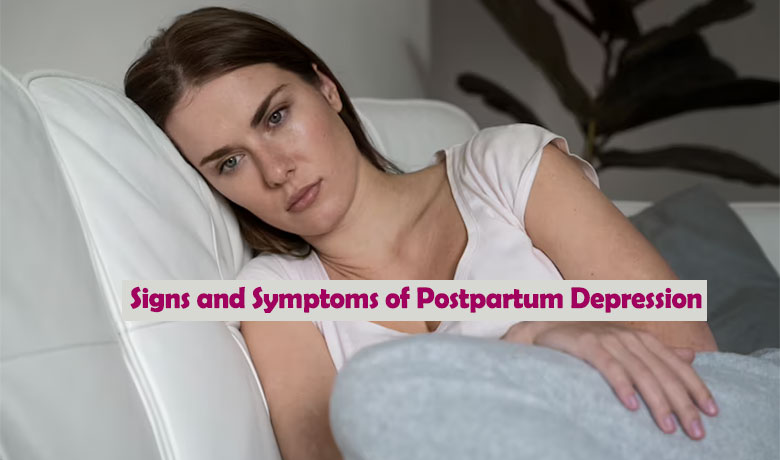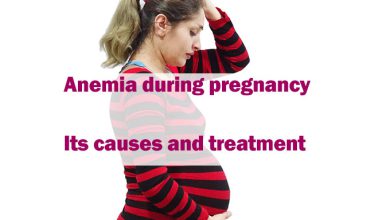Signs and Symptoms of Postpartum Depression

Postpartum depression (PPD) is a prevalent mental health condition that affects women after childbirth. It is important to identify the signs and symptoms of PPD to ensure early detection and appropriate intervention. This article aims to provide a comprehensive overview of the signs and symptoms associated with postpartum depression.
With the hope of continuous improvement and enhancing the quality of life for postpartum mothers, recognizing and addressing postpartum depression as an identifiable condition is essential.
By understanding the signs and symptoms, seeking help, and providing appropriate support and treatment, we can empower mothers to navigate through this challenging period and foster a nurturing environment for both themselves and their babies. Together, we can promote maternal mental health and contribute to the well-being of families.
8 Signs and Symptoms of Postpartum Depression are as follows:
1-Emotional Symptoms:
Postpartum depression is characterized by a range of emotional symptoms, which may include:
- Persistent sadness or feelings of emptiness
- Frequent crying spells without an apparent reason
- Overwhelming feelings of guilt, shame, or worthlessness
- Loss of interest or pleasure in activities once enjoyed
- Irritability, mood swings, or excessive anger
- Anxiety, restlessness, or feelings of being overwhelmed
- Difficulty bonding with the baby
2-Cognitive Symptoms:
Postpartum depression can also manifest through various cognitive symptoms, such as:
- Difficulty concentrating or making decisions
- Racing thoughts or intrusive, negative thoughts
- Memory problems or forgetfulness
- Lack of motivation or energy
- Decreased self-esteem or confidence

3- Physical Symptoms:
While postpartum depression primarily affects the mother’s emotional and cognitive well-being, it may also present with physical symptoms, including:
- Changes in appetite, either increased or decreased
- Sleep disturbances, such as insomnia or excessive sleep
- Fatigue or low energy levels
- Headaches, stomachaches, or other unexplained physical discomfort
Related posts: Trouble Sleeping During Pregnancy
4- Behavioral Symptoms:
PPD can have a significant impact on a mother’s behavior and daily functioning. Common behavioral symptoms may include:
- Withdrawing from family and friends
- Avoiding social activities or isolating oneself
- Difficulty in performing daily tasks or taking care of oneself and the baby
- Decreased interest in personal appearance or hygiene
- Engaging in self-destructive behaviors or thoughts of self-harm
5- Relationship and Bonding Symptoms:
Postpartum depression can strain relationships and interfere with the mother’s ability to bond with her baby. Some specific symptoms in this regard include:
- Feelings of detachment or indifference toward the baby
- Resentment toward the baby or other family members
- Difficulty in connecting or forming an emotional bond with the baby
- Concerns about being a “bad” or inadequate mother
6- Duration and Timing:
Postpartum depression typically begins within the first few weeks after childbirth, although it can develop at any time during the first year. It is essential to note that it lasts longer and is more severe than the “baby blues,” which is a common condition characterized by mild mood swings and emotional changes that resolve within a couple of weeks after delivery. If symptoms persist for more than two weeks or worsen over time, it may indicate the presence of postpartum depression.
7- Risk Factors:
While postpartum depression can affect any new mother, certain factors increase the likelihood of developing this condition. These risk factors include:
- Personal or family history of depression or anxiety
- Previous experience with postpartum depression
- A history of mental health conditions
- Lack of social support or a stressful life event
- Complications during pregnancy or childbirth
- Hormonal changes and fluctuations after childbirth
- Relationship difficulties or marital problems
It is important to remember that having one or more risk factors does not necessarily mean a woman will experience postpartum depression. Conversely, some women without any identifiable risk factors may still develop the condition.
Related posts: The Benefits of Prenatal Yoga and Meditation
Seeking Help:
Recognizing and acknowledging the signs of postpartum depression is the first step toward seeking help. It is crucial for healthcare providers, family members, and friends to be vigilant and supportive. Encouraging open communication and providing a non-judgmental environment can facilitate early intervention and treatment.
When a woman suspects she may have postpartum depression, she should reach out to her healthcare provider. A healthcare professional can conduct a thorough evaluation and provide appropriate treatment options, which may include therapy, support groups, medication, or a combination of approaches tailored to her specific needs.
What is the difference between postpartum depression and baby blues?
Postpartum depression is typically more severe and long-lasting compared to baby blues. While baby blues commonly occur in the first few weeks after childbirth and resolve within a short period, postpartum depression persists for a longer duration and has a greater impact on a woman’s emotional well-being.
What causes postpartum depression?
The exact cause of postpartum depression is not fully understood. It is believed to result from a combination of physical, hormonal, and emotional factors. Hormonal changes, sleep deprivation, previous mental health history, stress, lack of social support, and personal circumstances can contribute to the development of postpartum depression.
Related posts: Exercise During Pregnancy
Can postpartum depression occur in fathers/partners?
Yes, postpartum depression can also affect fathers or partners. It is referred to as paternal postpartum depression. While the prevalence is lower compared to mothers, fathers can experience similar symptoms of sadness, irritability, anxiety, and difficulty bonding with the baby. The risk factors and treatment options for paternal postpartum depression may vary.
How is postpartum depression diagnosed?
Postpartum depression is diagnosed through a comprehensive evaluation conducted by a healthcare professional. This evaluation typically includes a review of the woman’s symptoms, medical history, and any risk factors. Screening tools, such as the Edinburgh Postnatal Depression Scale (EPDS), may be used to assess the severity of symptoms.
Can postpartum depression be treated?
Can postpartum depression affect the mother-baby bond?
Can postpartum depression recur in subsequent pregnancies?
How long does postpartum depression last?
It is crucial for individuals to seek professional help if they suspect they or someone they know is experiencing postpartum depression. Early intervention and appropriate treatment can greatly contribute to recovery and overall well-being.
Conclusion:
Recognizing the signs and symptoms of postpartum depression is crucial for early identification and intervention. If a new mother experiences persistent and intense feelings of sadness, anxiety, or other emotional disturbances that interfere with her daily functioning and ability to care for herself and her baby, it is essential to seek professional help.
Early diagnosis and appropriate treatment can significantly improve the well-being of both the mother and the baby, allowing them to develop a healthy and nurturing relationship.
